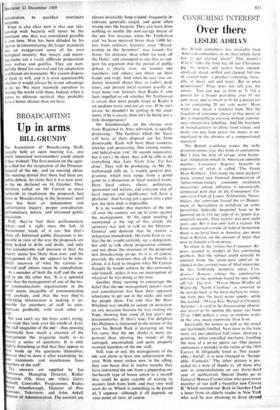BROADCASTING
Up in arms
BILL GRUNDY
The Association of Broadcasting Staffs recently held an open meeting (i.e., one which interested non-members could attend if they wished). The first motion on the agen- da called for the resignation of the Director- General of the BBC. and no messing about. The meeting denied that there had been any public debate, let alone that it was now over, as the Do declared on 16 October. They therefore called on Mr Curran to cease forthwith to implement the proposals laid down in 'Broadcasting in the Seventies' until there has been an independent and authoritative inquiry, proper consultation, parliamentary debate, and informed public discussion.
Well, they've had their parliamentary debate—and a right mess the lads in Westminster made of it too—but that's about all. Informed public discussion is im- possible in view of the way the proposals are being leaked in dribs and drabs, and only after considerable staff pressure at that. An inquiry seems less likely than ever, and the management of the BBC appears to be com- pletely unaware of what the various in- crested staff unions mean by consultation. As a member of both the staff and the ABS id to me the other day, 'It is a splendid rony that the management of one of the ma- r communications organisations in the orld seems incapable of communicating *th anybody, and that the way they're tholding information is making it im-
sible for members of staff to com- unicate profitably with each other as ell'.
But you can't say the boys aren't trying. st week they took over the whole of Ariel, he staff magazine of the asc'—thus proving ncidentally how much a creature of the nagement the magazine really is—to nswer a series of questions. It is only tightly disturbing to find that they appear to ave made up the questions themselves, ause they've done it after examining 're- nt statements and manifestoes from tubers of the staff'.
The answers are supplied by Ian rethowan, Managing Director, Radio- ignate (Oh, these BBC titles); Gerry ansell, Controller, Programmes, Radio; avid Attenborough, Director of Pro- mines, Television; and John Arkell, 'rector of Administration. The answers are
almost invariably long-winded, frequently ir- relevant, generally turgid, and quite often wrong into the bargain. They can have done
nothing to soothe the now-savage breast of the ABS. For instance, when Mr Trethowan
said 'we have received fewer than 1,000 let- ters from ordinary listeners since "Broad- casting in the Seventies" was issued—far fewer, for instance, than when we took off the Dales', and attempted to use that to sup- port his argument that the period of public
debate is clearly over, no wonder ABS members, and others, just threw up their hands and wept. And when he says 'our au- dience research shows that, at radio's peak times, our present local stations usually at- tract more VHF listeners than Radio 4'. one feels impelled to ask whether Mr Trethowan is aware that most people listen to Radio 4 on medium wave and not on via-. If he isn't aware, he shouldn't be joining in the argu- ment; if he is aware, then isn't he being just a little disingenuous?
Mr Attenborough, on the change over from Regional to Area television, is equally distressing: 'The facilities which the Areas will have at their disposal are far from dismissible. Each will have three cameras. telecine and processing, film cutting rooms, and helical-scan writ'. (It sounds impressive, but it isn't.) 'In short, they will be able to do everything that Late Night Line Up has done'. They will be producing, so Mr At- tenborough tells us, 'a weekly general pro- gramme, which may range from a panel game to a discussion or local musical event. Here local artists, choirs, politicians, sportsmen and writers, and everyone else of local interest and significance, will have a platform'. And having got a quart into a pint pot, my next trick is impossible.
It is no wonder that members of the ABS all over the country are up in arms against the management. At the open meeting I mentioned at the top of this article, the secretary was sent to talk to the Director- General and demand that he receive a delegation immediately. He came back to say that the no would certainly see a delegation, but only to talk about programme content, and not about the structure of the proposed new broadcasting set-up. As it is, of course, precisely the structure that all the hoo-ha is about, it is hard to imagine what Mr Curran thought he would achieve by this extremely odd remark, unless it was no interruption of whatever he was doing at the time.
Another thing seeming to encourage the belief that the BBC management doesn't want real consultations has been their apparent reluctance to get out in the sticks and meet the people there. I'm told that Mr How Wheldon was unable to accept an invitation on one occasion because he was visiting the Pope, showing him some of last year's BBC documentaries. If that's true, I'm delighted His Holiness is interested in the nature of the grass his British flock is pasturing on, but I'm sorry that the BBC thinks it more im- portant than clearing the minds' of the outraged, unconsulted, and quite properly worried members of the sac staff.
Still, true or not, the management of the sac can claim at least one achievement this year. With more strikes now in the offing, they can boast that in twelve months they have converted the ABS from a puppydog-on- the-hearth type of house union to a mastiff that could be quite capable of tearing its masters limb from limb, and may very well soon do so. Which is something to be proud of, I suppose—although it all depends on your point of view; of course.














































 Previous page
Previous page